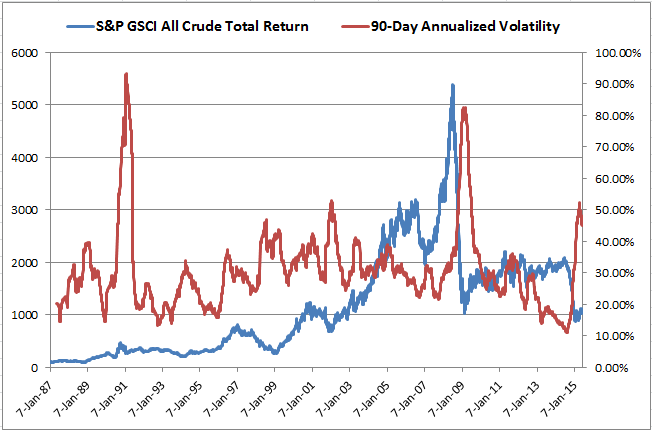In light of the decision by OPEC (Organization of the Petroleum Exporting Countries) to maintain its 30 million barrel-a-day production level, the S&P GSCI All Crude lost 4.5% this week, bringing its year-to-date return down to -1.7%, back into negative territory. A status the index has not been able to maintain for more than 3 consecutive days since April 10 – that was 40 days ago.
Chart 1
This is evidence of the volatility that oil is experiencing right now, as you can see in the chart below. While today’s volatility is not the highest in history, it is now more than 45% – that is significantly higher than the historical average of about 30%. At this level, it appears, the volatility is too much for investors to bear, so managers are cutting their bets. Will this drive oil prices even lower than the OPEC supply itself?
Chart 2

The price formation of oil is dependent on volatility as the market tries to stabilize. What happens as OPEC continues to flood the market from a pure supply and demand standpoint is fairly obvious. Total supply increases, and until production is reduced enough from non-OPEC suppliers and inventories are drawn down or demand increases, the oil price most likely drops. However, the speculators play an extremely important role in production decisions impacting oil supply.
As Hilary Till pointed out in a comment to the FT, the role of a speculator has been debated for decades. Two of the most well-known research papers on the subject come from Paul Cootner of MIT and Holbrook Working of Stanford in the 1950’s and 60’s. The result of their research says everyone who hedges is a speculator but the risk taking is more specific to different market participants. For example, a producer does not eliminate his risk in the futures market but creates a basis risk that is the difference between the spot and futures price which is more predictable to manage. This is important since it allows the producer to hold more inventories than would otherwise be possible.
The above explanation is precisely why OPEC’s decision to continue to produce oil can backfire and spike the oil price. One more time, WHY?